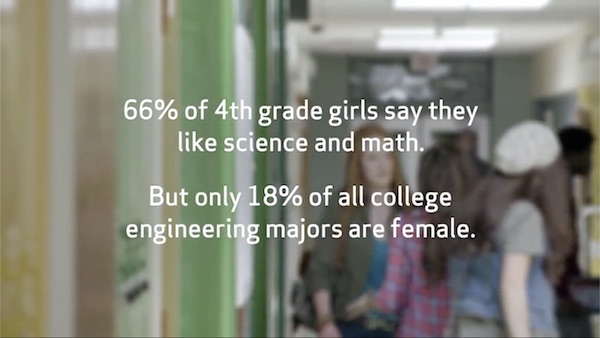Verizon has a great new commercial, “Inspire Her Mind,” that reminds parents to consider how their commonplaces discourage girls from studying the science.
We see a girl at various moments exploring the natural world and hear parental voices stifling that exploration. The commercial concludes with Sam looking at a science fair poster, putting on lipgloss, and turning away with her two friends.[1] A voiceover reminds us:
Our words can have a huge impact. Isn’t it time we told her she’s pretty brilliant too? Encourage her love of science and technology, and inspire her to change the world.
Constant diligence is required to root out the many ways we discourage women from pursuing sciences.
But why do we only worry about inspiring girls (and children more broadly) to study science? Why don’t we also try to inspire them to study literature or philosophy or history? There is nothing special about “science” or the “huge impact” our words have in steering girls away from or toward certain subjects. We should expend equal effort to guard against the ways we track girls into or out of all pursuits.
Let’s stop trying to inspire girls to study science and try, instead, to encourage and embolden girls to study anything and everything that inspires them.
-
A quick nitpick: Why does the commercial end by contrasting lipgloss with science? Is there something that prevents women from applying lipgloss and studying science? What stereotype of science and scientist is reinforced here? Why should people who care about their appearance not also care about science? And, as My Brighter Career points out, there’s lots of science in lipgloss. ↩

As a female engineer I would love to point out there is science behind the manufacture of lip gloss. Perhaps if science teachers focus on science from a different perspective instead of rockets, cars and other male view points more girls would participate. When last did you see a lipstick manufacturing project at a science fair?
You are spot on. I thought about making a similar point and drawing attention to all the science behind cosmetics—from initial development through testing and scaling to manufacture. As a former chemist, my thoughts turned initially to the chemistry of fragrances. But I ended up wanting to make a broader point about how we track girls into and out of various subjects.
Your point is a great one. Thanks.
I definitely agree about the point on science and lip gloss; one of the problems is that science lessons at school don’t tap into what children in general and girls in particular are interested in. But I disagree about encouraging girls to study philosophy, literature and history – or rather, I disagree that it is as necessary as encouraging them in science. Girls already disproportionately study those subjects; we don’t have a shortage of female english graduates or historians. We do have a shortage of female scientists. Children should be encouraged to follow whatever path they enjoy and are good at, but society still enforces the idea of gendered subjects.
Thanks for the comments. I don’t think we disagree, though we may place greater emphasis on different issues. Your last sentence captures the point I was trying to make:
“Children should be encouraged to follow whatever path they enjoy and are good at, but society still enforces the idea of gendered subjects.”
In all sorts of ways we track girls (and boys) into and out of subjects. My point is: parents (and society as a whole) should not decide for girls (or boys) what majors they should or should not study. Rather, we should work to remove the barriers and impediments and cultural expectations that dissuade girls (and boys) from studying what inspires them.
As you point out, we have a significant and troubling gender imbalance in most of the sciences. Addressing the causes of that imbalance requires more than simply encouraging girls to study science, which will do little to address the ways that science and so many other subjects and professions are gendered.
I agree there is a problem. But the problem is not the gender imbalance in the sciences (any more than its the gender imbalance in primary school teaching). That is a symptom of a deeper problem that I was trying to point out: the ways “society still enforces the idea of gendered subjects,” as you put it.
I hope I haven’t sounded adversarial or confrontational. I don’t mean to. I really appreciate your thoughts. Thanks for taking the time to comment.